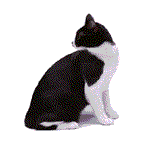You may have heard that this breed is the "Canine
of the Feline World". This reference to the loyalty and eager-to-please-attitude that is often exhibited by dogs, is
also a common trait in the Maine Coon. You will find that your Maine Coon will meet you at the door and be happiest when
near you. They follow you from room to room in the home and although some are genuinely "lap cats", others are happy
to just sit next to you. Maine Coons really enjoy owning their humans and can often be taught
to do tricks, being a very intelligent cat that learns rapidly. The Maine Coon is not a high maintenance breed. Often a combing every few days and bi-weekly
nail trimming is all the work they physically require. I suggest that new owners keep a comb near the chair they sit in and
when the cat joins you for a bit of television viewing, take the opportunity to comb through the coat as well as petting.
This makes the experience a positive one for both of you. It has been documented by the medical community that petting a cat
can lower your stress level and your blood pressure!
The coat of the Maine Coon consists of two types, a soft downy undercoat, that in the wild would act as an
insulator, and guard hairs, along their back that are water repellent and almost never mat. The soft undercoat will mat if
not combed, due to the downey texture. They have tufts of fur between their toes, which in the wild served as snow shoes,
allowing them to traverse on top of the snow and with their long, square muzzles, enabling them to catch mice, they were excellent
hunters. They have ear hair or furnishings, which helped keep the wind and dirt out of their ears. Even their long tail could
be used to wrap across their face to insulate them from the elements and allow them to breathe during a blizzard. All in all,
the many special features of the Maine Coon are what allowed the breed to survive in the cold, harsh climate of the Northeast.
Maine Coons are a very easy going breed and make wonderful
companions for almost any family. They adjust well to other cats, dogs, and even children. They are desired for their temperament
as well as beauty. Both the male and female are affectionate and will rapidly become a member of your home. The male will
be larger than the female, with most males averaging 15-18 pounds at maturity. The female will be larger than most common
house cats and be in the 9-13 pound range in weight.
The
Maine Coon is in high demand as a companion animal and many breeders have a waiting list for kittens. Check with breeders
in your area for availability. You can check with the Fanciers and Breeders Referral List listings.
When you go to the home of a breeder, you should be allowed to see the parents of the kittens, the
living area where the kittens were raised and other cats that live there. You want to make sure the kittens are free from
obvious illness, have bright eyes and are energetic and playful. Watch for signs of weepy eyes, sneezing and nasal discharge.
Although kittens often get a slight respiratory problem when they change environments, you want the breeder to offer a health
guarantee within their contract. Note how friendly the kittens appear, and although strangers frighten some, you want a kitten
that is outgoing if you have an active family or more relaxed if you have a quiet home.
Most breeders will give you a pedigree of the kitten as well as instructions on the care
and feeding of your new kitten. Often the registration papers will be withheld until the kitten is altered, if they are not
altered prior to your picking up the kitten. Many times the breeder's contract will state restrictions such as not allowing
the kitten outdoors, or not allowing declawing. Ask your breeder for his/her expectations as well as presenting them with
your own questions. This will help ensure that you and your Maine Coon will start off on the right foot and you both will
enjoy many years of companionship.

